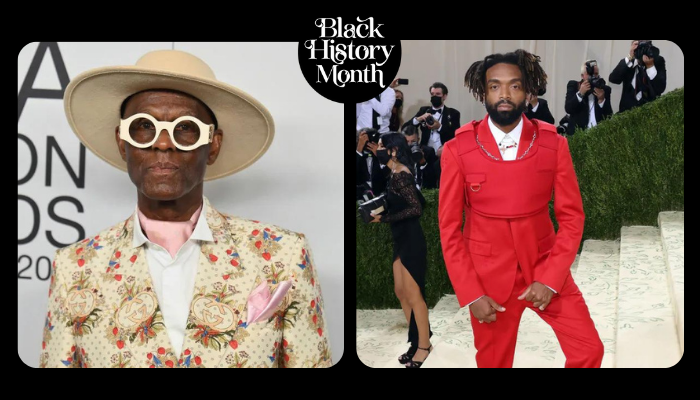Dapper Dan to Pyer Moss: The Beginnings & Current State Of Leading Black Designers

Source: BreAnna Holmes / Radio One Digital
Throughout Black history, the rich lineage of designers is immaculate from both a visual perspective and business model alike. From the pioneering days of Ann Lowe, widely recognized as the first prominent Black fashion designer to achieve notoriety, and the cutting-edge designs by Willi Smith in the ‘70s and ‘80s that helped make streetwear what it is today, according to Alexandra Cunningham Cameron’s 2020 hardcover Willi Smith: Street Couture, the message has been made quite clear: Black will always be in style!
When looking back at those who’ve helped push the trend of leaders in Black fashion-forward over the years — Patrick Kelly, Stephen Burrows, Tracy Reese, Sean “Diddy” Combs, Kimora Lee Simmons and the late Virgil Abloh are just a handful that come to mind — not many have shared the highs and lows that can come from breaking barriers quite like Harlem’s own Dapper Dan.
“Fashion designers create from their mind, like poets and writers… I feel more like a doctor – I have to make the patient feel good.” – Dapper Dan, The Guardian (2021)
A true hustler in every spirit of the word, Dapper Dan’s world of fashion was far different from the glitz and glam of his contemporaries. After getting started by selling shoplifted designer garbs from the trunk of his car, Dap eventually opened his now-infamous Dapper Dan’s Boutique on 125th Street between Madison Ave & Fifth in NYC.
The racism he faced while trying to make it as a legit wholesaler due to the shop’s urban location, and quite frankly the color of his skin, resulted in the Uptown creative flipping the script and making it on his own by creating mint condition high-end knockoffs that he called “knock-ups” and utilizing a cutting-edge approach to screen-printing on leather.
At his peak, Dapper Dan was crafting custom Gucci and Louis Vuitton looks for hip-hop’s elite like LL Cool J and Salt-N-Pepa to street hustlers like notorious kingpin Alpo Martinez. However, due to a highly-publicized 1992 lawsuit by FENDI, Dan’s entire operation was shut down and he was forced underground as a private designer. Floyd Mayweather Jr. would go on to rock Dapper Dan exclusives throughout 1999, and the late R&B icon Aaliyah can be seen donning a custom Chanel catsuit by the designer in one of her last music videos for the 2002 hit “More Than A Woman.”
Jump to two decades later, and it’s almost impossible not to see a burgeoning Black designer spearheading a high-fashion campaign.
Before his untimely death in November 2021, Abloh was at the forefront of Louis Vuitton’s menswear line and helped make streetwear mainstream with his popular OFF-WHITE  label. Haitian contemporary womenswear icon Stella Jean has created culture-centric designs that are unapologetically Black and rooted in African fashion. Suppose we’re looking at true successors to the legacy of Dapper Dan. In that case, though, Kerby Jean-Raymond of the budding fashion empire Pyer Moss is serving that same radical and game-changing feeling in fashion for today. It was no surprise when he became the first Black American designer to debut at Paris Haute Couture in July 2021.
label. Haitian contemporary womenswear icon Stella Jean has created culture-centric designs that are unapologetically Black and rooted in African fashion. Suppose we’re looking at true successors to the legacy of Dapper Dan. In that case, though, Kerby Jean-Raymond of the budding fashion empire Pyer Moss is serving that same radical and game-changing feeling in fashion for today. It was no surprise when he became the first Black American designer to debut at Paris Haute Couture in July 2021.
Kerby’s choice to include themes of police brutality and highlighting the Black Lives Matter movement in his collections has done a lot to showcase our struggles while also celebrating Black excellence with a theatric beauty. As illustrated in a 2019 profile for Vogue Business, the move to get political in his SS16 show almost cost him his career.
He told the outlet, “Within 36 hours, six of my biggest accounts dropped me,” also adding, “The remaining ones were sub-$20,000 season accounts – not enough to keep our lights on. So I’m at this point where I’m about to lose my company, I’ve pissed off investors and I’m getting death threats from white supremacist groups.”
His approach and eventual perseverance are relatable to Dappen Dan’s rebellious frame of mind when deciding to fight racism by beating the elitist fashion industry at its own game, which thankfully has now led to proper recognition and a current resurgence of his legacy with Dapper Dan of Harlem, a boutique in official collaboration with Gucci located in the same area where he once was denied their service.
Seeing what pioneers like Dapper Dan started and successors like Kerby Jean-Raymond continue to do as designers in Black fashion today proves that we’re only beginning to see what our culture will do in the field moving forward. Now that’s fly.


